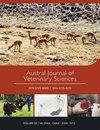从马来西亚家禽养殖场分离的多杀性巴氏杆菌的分子特征和抗生素敏感性
IF 0.8
4区 农林科学
Q3 VETERINARY SCIENCES
引用次数: 1
摘要
禽霍乱在全世界许多家禽生产国造成了重大的经济损失。在马来西亚,在不同类型的家禽生产中经常报告和遇到家禽霍乱的爆发。本研究的目的是描述2000年至2018年期间从马来西亚中部半岛家禽霍乱暴发中分离出的13种禽多杀性巴氏杆菌的特征。采用多重聚合酶链反应(PCR)进行荚膜分型,圆盘扩散法进行抗菌药物敏感性分析,并采用脉冲场凝胶电泳(PFGE)和多位点序列分型(MLST)进行分子基因分型。荚膜血清分型结果显示,13株多杀性巴氏杆菌均为荚膜血清型a。所有分离株均对红霉素(100%)、链霉素(68%)、四环素(37%)、恩诺沙星(37%)、氟苯尼考(23%)、青霉素G(14%)、庆大霉素(14%)、阿莫西林(14%)耐药。PFGE分析将分离物聚为3个克隆。A组包括2000年、2013年和2018年的分离株,相似性为87%。通过MLST分型鉴定出3种序列类型,分别为ST129、ST231和ST355。ST355是首次在农村工业研究与发展公司(RIRDC)数据库中分配的。此外,印度、中国和斯里兰卡也报告了ST129,这凸显了亚洲国家之间传播的可能性。本研究提供了在马来西亚半岛中部地区引起家禽霍乱暴发的多杀性巴氏杆菌的流行病学信息。本文章由计算机程序翻译,如有差异,请以英文原文为准。
Molecular characterisation and antibiotic sensitivity profile of Pasteurella multocida isolated from poultry farms in Malaysia
Fowl cholera has caused significant economic losses in many poultry producing countries worldwide. In Malaysia, outbreaks of fowl cholera are frequently reported and encountered in different types of poultry productions. The objective of this study was to characterise 13 avian Pasteurella multocida, isolated from fowl cholera outbreaks in Central Peninsular Malaysia in the period between 2000 and 2018. The isolates were subjected to multiplex polymerase chain reaction (PCR) for capsular serotyping, disc diffusion method for antimicrobial susceptibility profiles, and molecular genotyping using pulsed-field gel electrophoresis (PFGE) and multilocus sequence typing (MLST). The capsular serotyping showed all 13 Pasteurella multocida isolates belonging to capsular serotype A. The antimicrobial susceptibility showed several multidrug resistance strains among the P. multocida isolates. All the isolates were resistant to erythromycin (100%), streptomycin (68%), tetracycline (37%), enrofloxacin (37%), florfenicol (23%), penicillin G (14%), gentamicin (14%), and amoxicillin (14%). The PFGE analysis clustered the isolates into three clones. Group A included isolates with a similarity of 87% from the year 2000, 2013, and 2018. Three sequence types were identified using MLST typing namely, ST129, ST231, and ST355. The ST355 was assigned for the first time in the Rural Industries Research and Development Corporation (RIRDC) database. Besides, ST129 has been reported in India, China, and Sri Lanka, which highlights the possibility of transmission between Asian countries. This study provides an insight into epidemiological information of Pasteurella multocida that causes fowl cholera outbreaks in the central region of Peninsular Malaysia.
求助全文
通过发布文献求助,成功后即可免费获取论文全文。
去求助
来源期刊

Austral Journal of Veterinary Sciences
Veterinary-General Veterinary
CiteScore
1.60
自引率
0.00%
发文量
18
期刊介绍:
Austral Journal of Veterinary Sciences (formerly Archivos de Medicina Veterinaria) publishes original scientific contributions in English, containing the latest developments and discoveries in veterinary sciences. The journal covers topics such as animal health and production, preventive medicine, zoonosis, pharmacology and therapeutics, methods of diagnosis, and other areas related to the veterinary field.
Austral Journal of Veterinary Sciences aims to divulge information about advances in veterinary medicine among universities, research centres, industries, government agencies, biologists, agronomists and veterinarians.
 求助内容:
求助内容: 应助结果提醒方式:
应助结果提醒方式:


